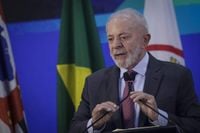The government of Brazil has proposed a new minimum wage of R$ 1,630, set to take effect on January 1, 2026. This proposed wage represents a nominal increase of 7.37% from the current minimum wage of R$ 1,518, as outlined in the 2026 Budget Guidelines Bill (PLDO) submitted to the National Congress on April 15, 2025.
The adjustment follows a formula that combines the projected inflation rate of 4.76% for the 12 months ending in November 2025 with a real growth ceiling of 2.5% above inflation, which was established by the fiscal framework. This formula aims to ensure that public spending remains under control, preventing excessive increases that could destabilize the economy.
In addition to the proposed minimum wage for 2026, the government has also provided preliminary estimates for the following years: R$ 1,724 for 2027, R$ 1,823 for 2028, and R$ 1,925 for 2029. However, these projections are subject to revision based on future economic conditions and inflation rates.
According to the Ministry of Planning and Budget, each R$ 1 increase in the minimum wage has a significant impact on the federal budget, costing approximately R$ 400 million. This is because many social benefits, including pensions, unemployment insurance, and the Continuous Cash Benefit (BPC), are linked to the minimum wage. The projected increase in the minimum wage is expected to add R$ 115.3 billion in expenses, while revenue is anticipated to increase by R$ 71.2 billion.
The readjustment formula for the minimum wage was reintroduced in 2023, which includes both the previous year’s inflation and GDP growth from two years prior. This method was previously used from 2006 until 2019. However, due to the new fiscal framework enacted last year, the real growth of the minimum wage has been limited to a maximum of 2.5% above inflation. This change was intended to balance the need for wage growth with the necessity of maintaining fiscal responsibility.
President Luiz Inácio Lula da Silva's administration faces the ongoing challenge of raising the minimum wage while adhering to fiscal constraints. The new proposal reflects a commitment to improving the living standards of workers in Brazil, while also recognizing the need to control public spending. The government has emphasized the importance of this balance, especially in light of pressures for increased social investment and the need for sustainable economic growth.
As part of the broader economic plan, the PLDO also outlines fiscal goals for the next three years. The government aims to achieve a primary surplus of R$ 34.3 billion, which is equivalent to 0.25% of GDP, as stipulated in the 2025 LDO. This surplus is projected to increase over the following years, reaching 0.50% of GDP in 2027 and 1.25% by 2029.
Despite the optimistic projections, some economists caution that the government's inflation estimates may be overly optimistic. Market analysts have indicated that inflation could exceed the government's projections, which may lead to adjustments in the proposed minimum wage as the year progresses. The final determination of the minimum wage for 2026 will depend on economic performance and inflation trends observed in the months leading up to its implementation.
The implications of the proposed wage increase extend beyond just the minimum wage earners. With the minimum wage serving as a benchmark for various social benefits, any changes to it can have a ripple effect throughout the economy. As the government prepares to implement these changes, stakeholders from various sectors are closely monitoring the developments, weighing the potential impacts on both workers and the broader economic landscape.
In summary, the proposed increase in the minimum wage to R$ 1,630 reflects the government's commitment to improving worker compensation while navigating the challenges of fiscal responsibility. As Brazil moves forward, the outcomes of this proposal will be closely watched, as they hold significant implications for the nation’s economic health and social welfare.








